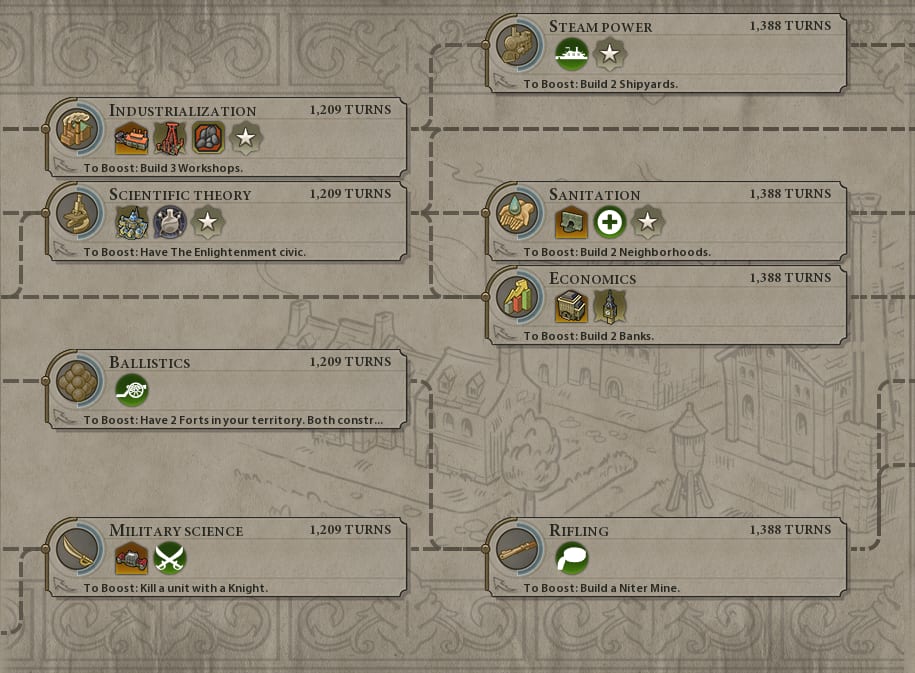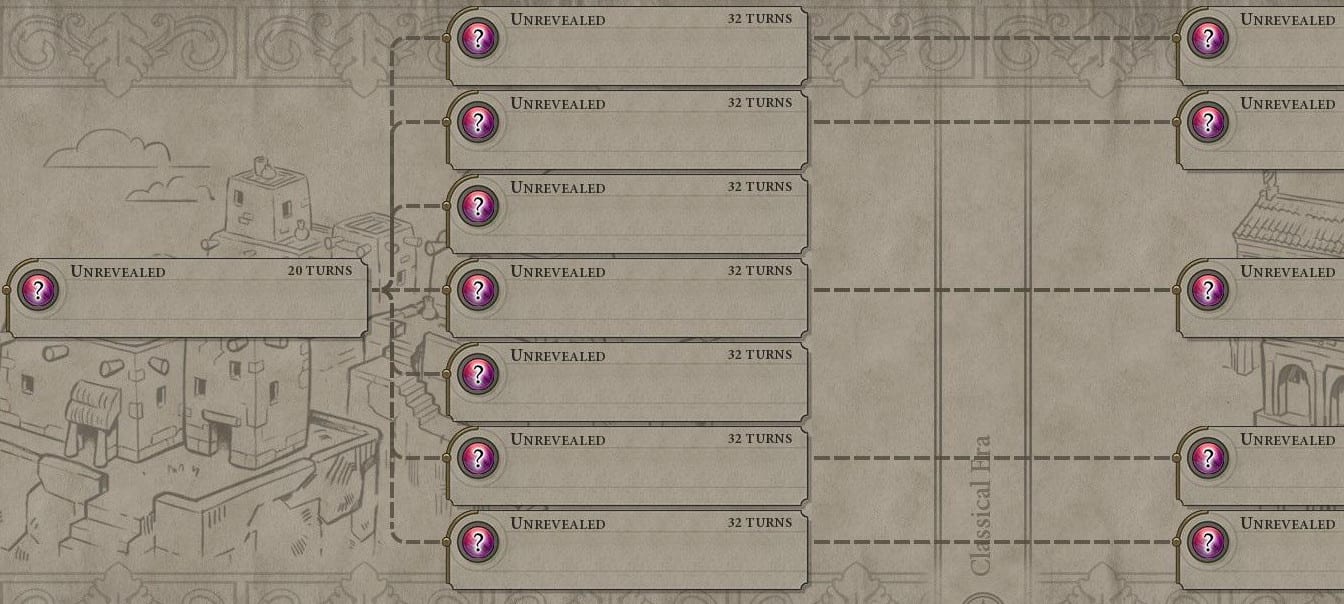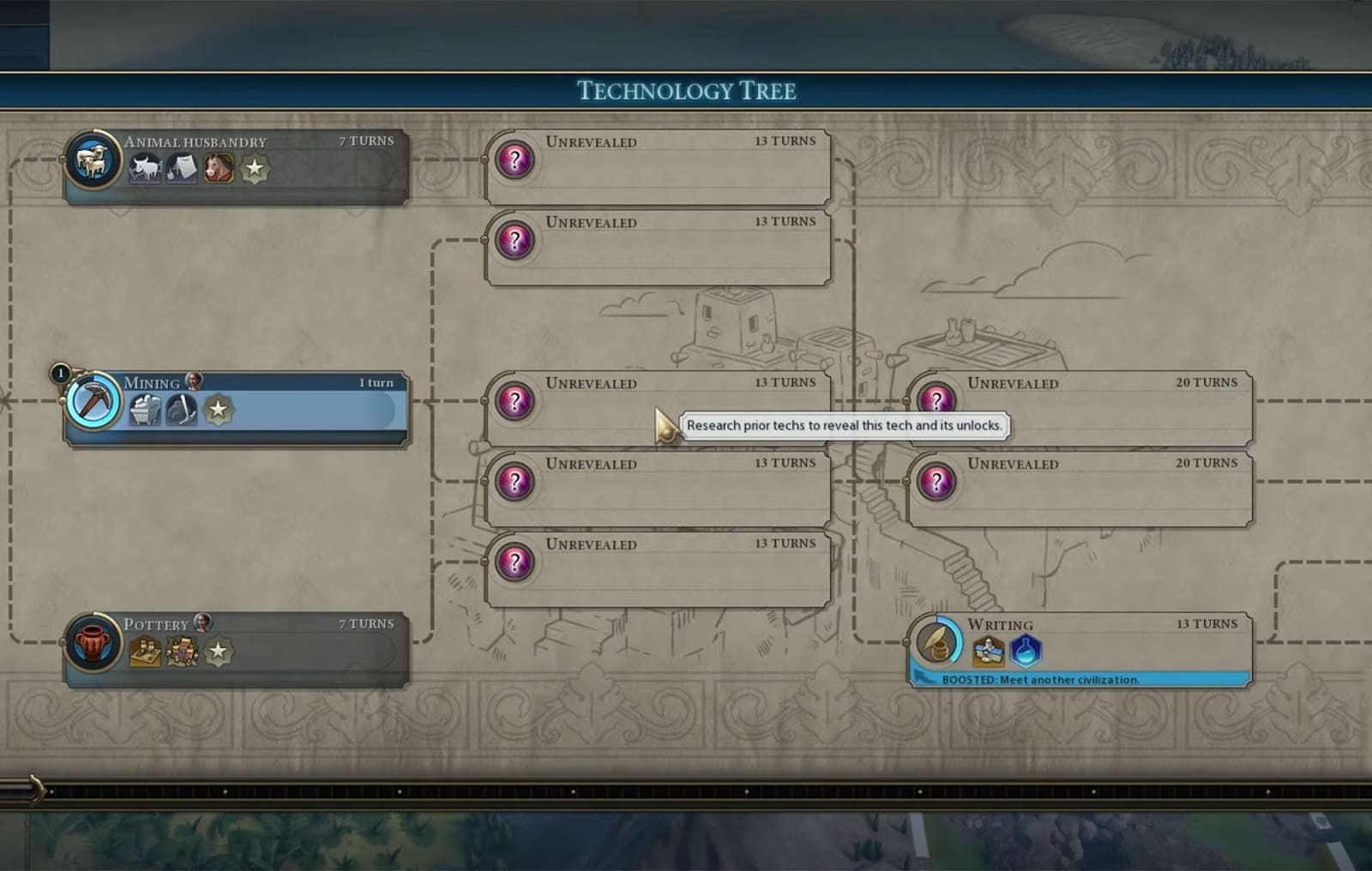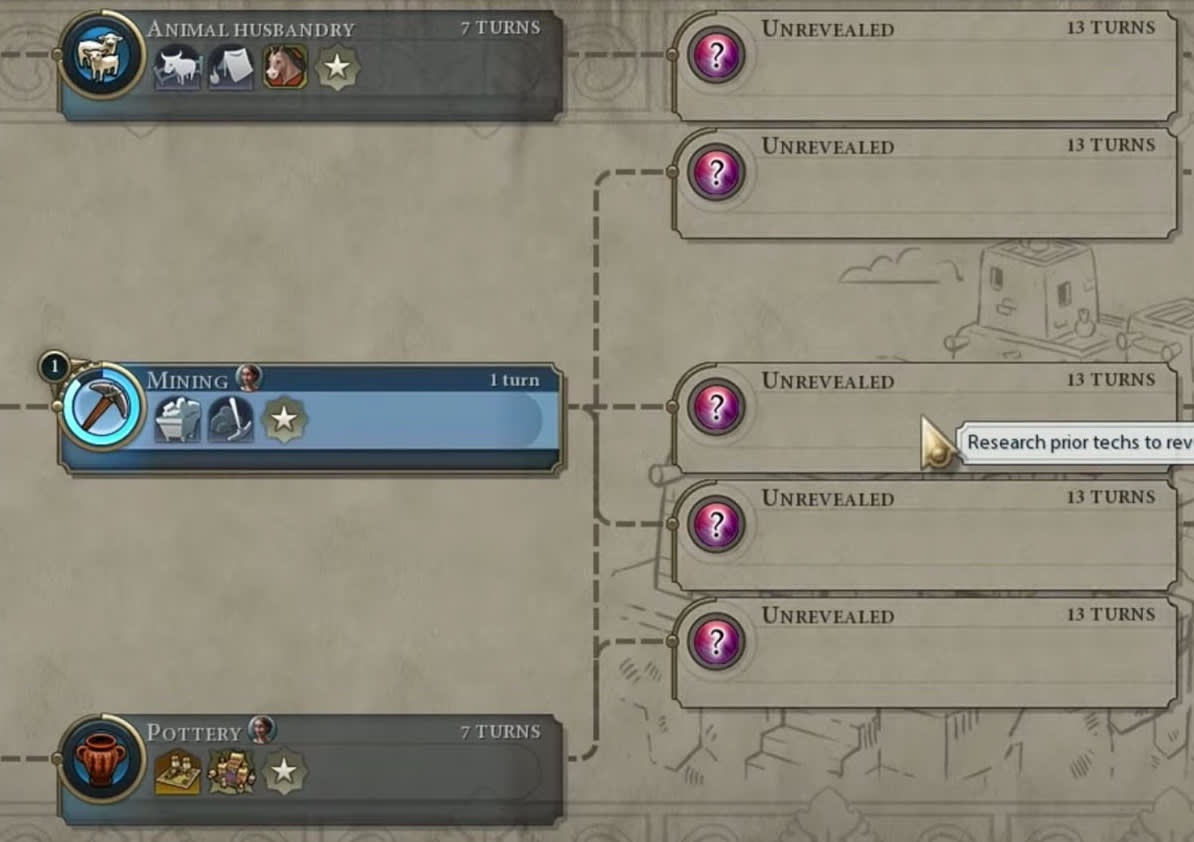Lessons on Value of Information From Civ
I’m a big fan of the game Civilization. Civ is the canonical empire-building game: you explore the world, expand your empire, manage your economy, invade other empires, unlock new tech, etc. A few months ago, the game released “tech shuffle mode”, which radically changes the game (and IMO makes it a lot more interesting). Usually, a not-yet-unlocked section of the tech tree looks like this:

To unlock a tech, we first need to unlock the prerequisite techs (in left-to-right order). The tree is the same in every game, so we can plan ahead to unlock key technologies early—e.g. we can ignore the lower half of the tree in order to get to Steam Power faster. But with tech shuffle mode, a not-yet-unlocked section of the tree looks like this:

The tree structure is randomly generated each game (although techs are still grouped by “era”, so e.g. we won’t unlock nukes right at the start of the game). Techs are also hidden until we’re ready to research them (i.e. until we unlock the prereqs). That means, for instance, that we can’t focus resources on techs needed to unlock Steam Power because we don’t know where in the tree Steam Power is.
But there’s a catch: there are actions we can take to reveal a tech in the tree. This is the “tech boost” mechanic—for instance, by finding another civilization, we can “boost” Writing, reducing the resource cost to unlock it by 40% and (more importantly) revealing its position in the tree. It looks like this:

In other words: we can pay to acquire information.
This is especially important when the value of information (VOI) is high. What does that look like? Like this:
There’s several different branches, each several techs deep. The strategically-important tech we want is somewhere at the end of one of those branches, but we don’t know where. Brute-force searching all of the paths until we find it would require unlocking ~½ of these techs on average, but if we knew which branch to take, then we’d only need to unlock one branch—i.e. ~¼ of them in this case. So, I can pay some resource cost to reveal my target tech in the tree, and then I can get to it about twice as quickly (on average).
I realized the importance of the tech boost mechanic as a way of purchasing information after my first game on tech shuffle mode. It seemed that VOI was often very high, so I made an explicit effort to pay attention to it in my next few games.
The result: even when explicitly trying to pay attention to VOI, I regularly noticed that I wasn’t investing enough in it.
The basic problem is that VOI isn’t readily visible. I click into the tech tree, and I see something like

… and the natural response is “ok, my options are Animal Husbandry, Mining, or Pottery. Of those, Mining seems most useful right now, since it will let me build mines”. It’s so easy to say “well, I don’t have any information to prefer one unrevealed tech over another, and Mining is the most useful of the visible options, so I might as well start with Mining”. Animal Husbandry, Mining and Pottery are right there, they’re visible, they’re salient, they’re the obvious things to focus on. I have to step back a minute to realize that Animal Husbandry, Mining and Pottery are all basically-irrelevant right now compared to e.g. Shipbuilding, far and away the most important thing is to unlock Shipbuilding, which means the top priority is to figure out where Shipbuilding is. It’s so easy to weigh the visible options against each other, it’s such a natural instinct, but the optimal choice is to ignore the visible, direct consequences of each choice and instead gain more information.
This is, of course, a metaphor for the real world.
The real world is high-dimensional, so VOI is orders-of-magnitude higher than in Civ’s low-dimensional tech tree. There aren’t 4 possible paths to choose from, there are hundreds or thousands at least. The VOI isn’t a factor of 2 cost reduction on average, it’s a factor of 50 or 500 cost reduction. Brute-force work on every project in some random order realistically may never find the one or two big things which matter more than anything else.
It’s so easy to say “well, of all these projects, adding a page for X seems like it would improve our app the most”. Or “well, of all these projects, running ads on Y seems like it would increase our profits the most”. Or “well, of all these projects, trying a standing desk seems like it would increase my productivity the most”. There’s a list of projects right there in front of us, it’s so easy to imagine the direct consequences of each project. But in a high-dimensional world, with high VOI, the optimal choice is usually to ignore the visible, direct consequences of each choice and instead gain more information.
Thanks, knowing about this game mode makes me want to play Civ again!
I was wondering if you have any thoughts on how we as individuals might act to acquire useful information effectively. A lot of information out there that we normally consume (social media/news etc) is often eye-catching or interesting but not very useful (it doesn’t change our plans or outlook in life). Personally I would guess that books might be the best bet, but it can be hard to find the right ones.
This is a very large question; a significant fraction of all the posts on LessWrong are relevant. In particular, the World Modelling tag seems like a good starting point to look for relevant ideas.
I would specifically advise against looking for information which directly impacts your plans/outlook in life, and rather try yo obtain strong general-purpose understanding of aspects of the world which are relevant to you. The reason is that it often just isn’t possible for a strong understanding to be “shallow”—you need to figure out the big picture of how a system works before it’s clear which parts are critical for you specifically.
Thanks, I agree that LW is a good place to start reading. I would add that LW can also be a good source for curated material, i.e. someone might post about the best primary and secondary sources to find out more about a topic.
I also get your point about “broad” vs “shallow”. I do wonder what a good model would look like for reading since broad understanding in itself is relatively useless—it needs to be translated into shallow, technical understanding at some point.
There are two problems in decision-making. Representation is how we structure and evaluate information. Discovery is how we acquire information.
The Civ tech tree is one of those rare cases where “the map is the territory.” The problem of representation is handled for you by the computer program, and it is a perfect representation. You’re just trying to discover the map/territory so that you can choose the best route. Of course, you’re still left with the tricky problem of choosing a good overall strategy for the game that you’re in, but that’s irrelevant to your post.
Most real-world problems are dramatically more difficult. The problem of representation is not solved for you, and is impossible to solve perfectly.
So my interpretation of your post is that it’s easy to fall into a bad decision-making process, even when you’re working on a particularly simple problem.
This is a good post, and value of information is a candidate for my favorite undervalued subject.
This post makes me wonder about how to make VOI more explicit. If there were a way to build this into an explicit procedure, team, or asset then institutions would start doing it reflexively in the way that hammers make everything look like nails.
In companies, you could call this measurement neglect. VCs often push startups to measure more. The C level may know and want it. But there are indeed often more immediate things that occupy everybody.
I think it would be super valuable to be able to quantify the effect. Are there stats on the amount of measurement a company does to its success?